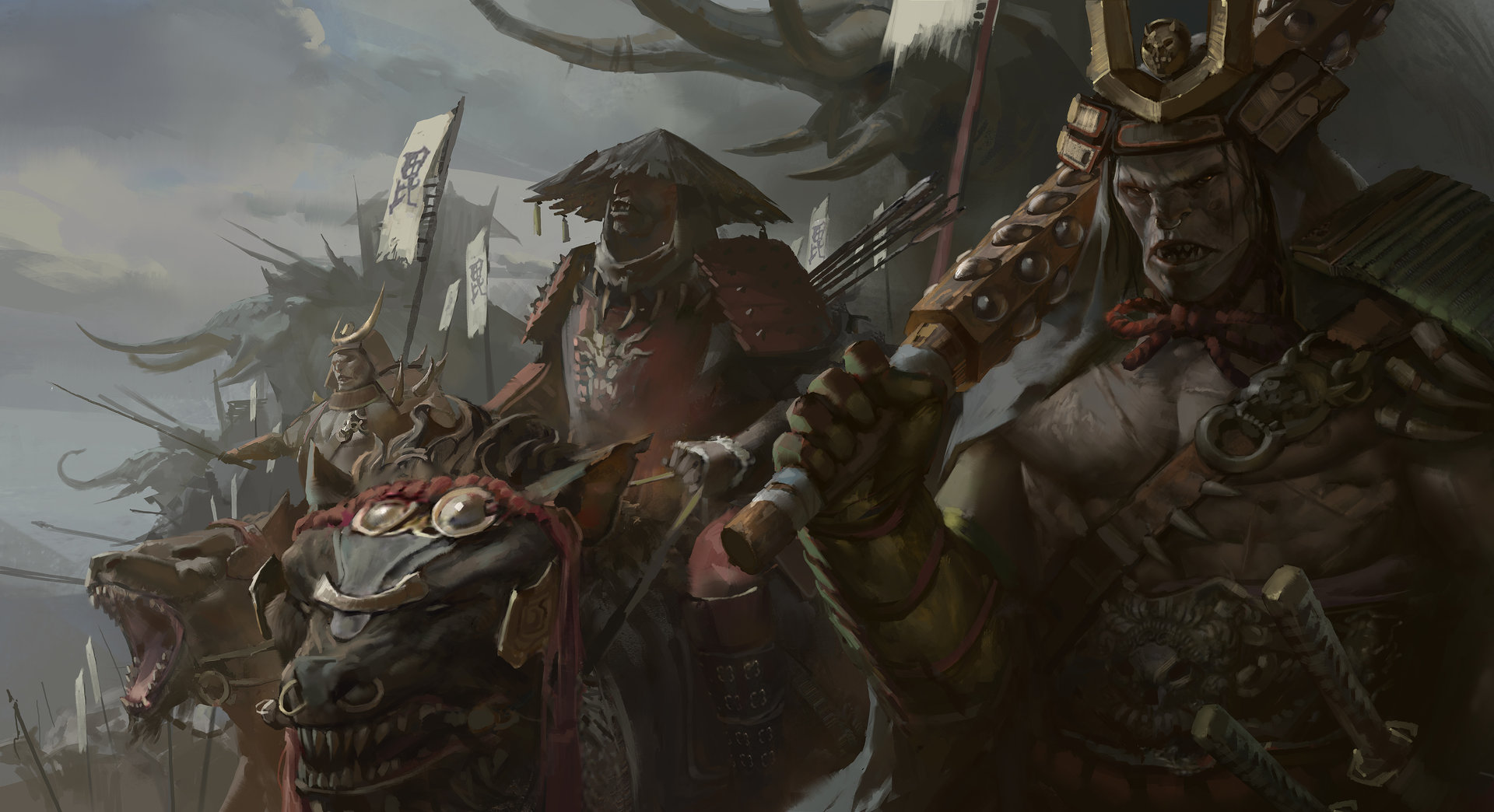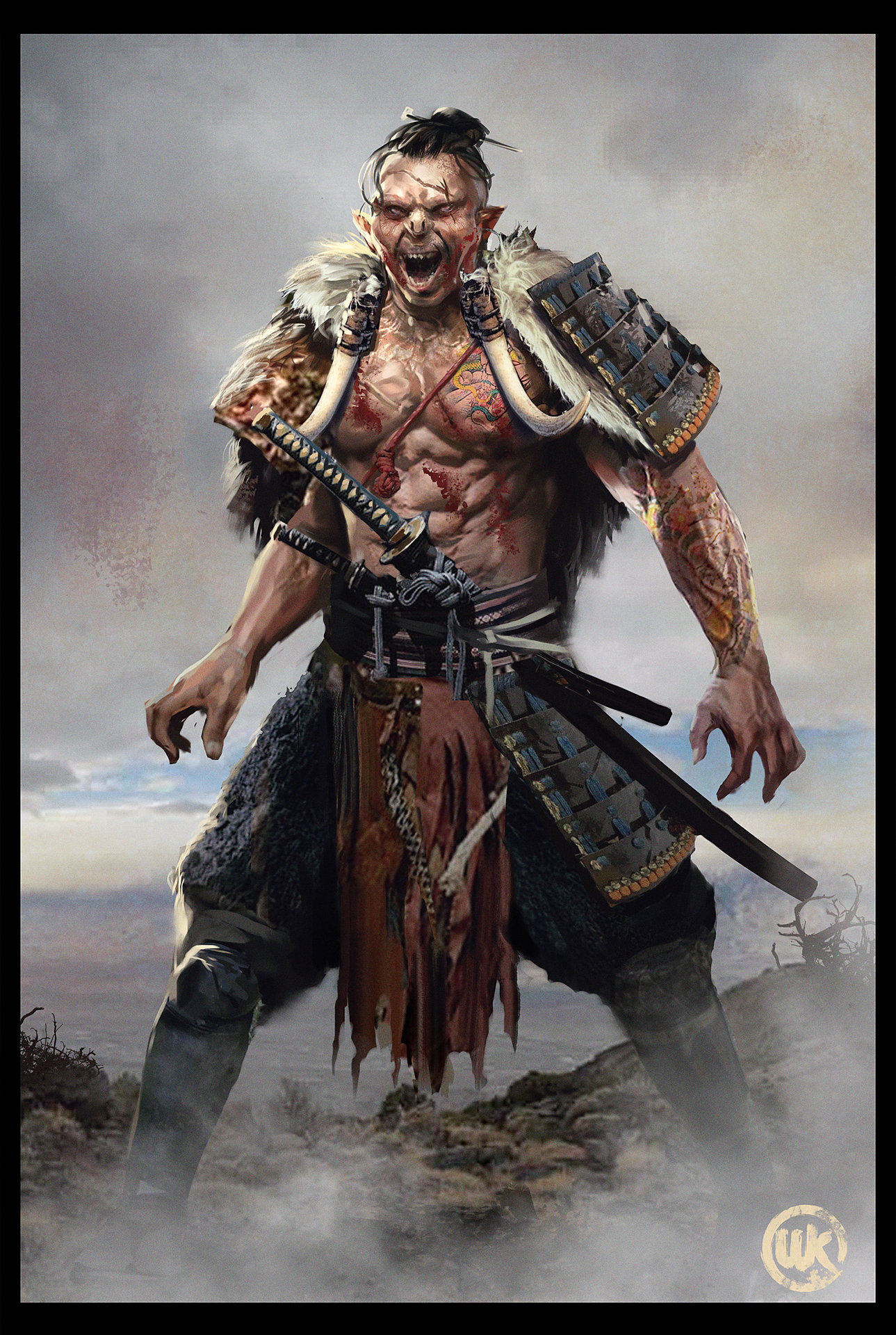The Odegai
The Odegai is a culture of orcish people, which included the Odegai Khans and their direct descendants. They ruled over and lived in Shikyuo for many generations until they were wiped out by the armies of Emperor Toshitsuga Tageshira. Details on their history and culture are hard to come by as they are considered forbidden knowledge by the current empress and her lords. All discovered artifacts must be turned in to the nearest lord. Not doing this is punishable by death.
There are two histories of the Odegai people, one is the officially recognized history, that describes a violent people, single-minded in their destruction, warring and killing each other and the other residents of Shikyuo without mercy. Their ruthless Khans leading their vile armies across the land killing the citizens of the nation in broad sweeping wars that lasted generations.
The other side is not common knowledge and has been secreted away by the current regime. It tells of a much more complex society. One that encourages spirituality, the path of knowledge, and personal expansion through trials of combat, will, and failure. These were the ideals of The Odegai, they sought this by both internal and external means. Travelling to the tops of mountains to train their minds to battle the physical pain of extreme cold, seeking out worthy adversaries in order to test their physical might and battle prowess. At times entire clans would battle against each other in wars of duelling ideals, fighting to prove whos road to enlightenment was the true path.
This is the original code of conduct of The Odegai and it differs from Khenbish’s Virtues. The clan leader of the Pema and his virtues are younger and more focused around the self-reflection, wisdom, and the spirit of oneself.
Historical Records
There are two histories of the Odegai people, one is the officially recognized history, that describes a violent people, single-minded in their destruction, warring and killing each other and the other residents of Shikyuo without mercy. Their ruthless Khans leading their vile armies across the land killing the citizens of the nation in broad sweeping wars that lasted generations.
The other side is not common knowledge and has been secreted away by the current regime. It tells of a much more complex society. One that encourages spirituality, the path of knowledge, and personal expansion through trials of combat, will, and failure. These were the ideals of The Odegai, they sought this by both internal and external means. Travelling to the tops of mountains to train their minds to battle the physical pain of extreme cold, seeking out worthy adversaries in order to test their physical might and battle prowess. At times entire clans would battle against each other in wars of duelling ideals, fighting to prove whos road to enlightenment was the true path.
Heritage and Ideals
The name Odegai is the common name used when describing all people within this culture, it can be roughly translated as Those of Fire. While these clans do not share any territory and have different, often opposing ideals, they still recognize their shared heritage and bloodline. These differences often pitted them against each other, beginning battles and wars of duelling ideologies. Strength of body and mind were of paramount in this society and physical and mental tests of the will were common amongst these people. The Odegai were separated into seven clans, each with their own territory, leader, and ideal. Each of the clans focused on a selected ideal, one that the clan and its people would adhere to and strive to achieve. Many of the clans seek personal enlightenment and wisdom, while others seek physical aptitude and cultural expansion. For example, Clan Pema strives to gain wisdom and will often value internal reflection and mental fortitude over a physical contest of strength. While Clan Tseten values determination and strength of will, and will often decide matters with tests of endurance and hardship. Each of the seven clans is represented here, with their last known clan heads listed.- Dolma - Liberation
Clan Head: Jochi of Clan Dolma - Lobsang - Spirit
Clan Head: Chambui of Clan Lobsang - Pema - Wisdom
Clan Head: Khenbish of Clan Pema - Tseten - Determination
Clan Head: Jungdu of Clan Tseten - Wangyal - Conquering
Clan Head: Guchlug of Clan Wangyal - Tseundu – Effort
Clan Head: Yisugei Qatun of Clan Tseundu - Sonam – Prosperity
Clan Head: Chagurkai of Clan Sonam
Codes of Conduct
While the specific ideals of each Odegai clan differ greatly, most Odegai people adhere to and follow strict codes of conduct. Consisting of eight virtues, these codes gave guidance to the people of the varying clans. These eight virtues are Justice, Courage, Mercy, Politeness, Honesty, Honour, Loyalty, and Self-Control. The codes while written the same throughout the Odegai clans are translated in different ways depending on the ideals of the clan itself. Courage for Tseundu Clan could be translated as a personal sacrifice to ensure the growth and safety of their clan as a whole. Where the same virtue for the Wangyal Clan could mean facing your fears and overcoming them despite the potential danger to yourself.
The clans also value these virtues differently, this means that if a situation arises where two values conflict in the resolution of a problem, the choice of which virtue to follow towards the solution will depend on the ideals of the clan. As an example, if a clan is tasked by a trusted associate to kill an enemy, one clan will kill that individual regardless of what may arise, this is because they value Loyalty over the other virtues. But a different clan could change their mind depending on the situation that arises during the mission, if they find the enemy only conducted his actions due to the need to protect his family, they may choose Mercy over Loyalty.
A depiction of Jochi, Head of Clan Dolma
Naming Conventions
They do not have family names, instead, they take on the name of the clan in which they are sworn to. An example of this would be Jochi of Clan Dolma, who also happens to be the Khan or leader of his clan and their territories. These clans names have stayed the same for centuries, even before the Khans took control over Shikyuo.
An individuals name is given to them at birth by their biological parents, usually, it represents a common trait the child commonly shows during the first weeks of life. On the individual is an adult they are granted a new name by their Clan Leader, one that will represent who they have become as an adult. If the Odegai has proven themselves leading up to this ceremony they may be granted the opportunity to choose their own name. A rare and honourable event only granted to a select few.
Examples of Odegai Names
Masculine Names:
- Boroghul
- Durulji
- Baltu
- Geugi
- Enkhjargal
- Nekun
- Qobolta
- Guchlug
- Togosemur
- Khenbish
- Tuyuideger
- Dinget
- Gansukh
- Chagurkhai
- Jungdu
- Bugudai
- Alchidai
- Jochi
Feminine Names:
- Tsetsegmaa
- Chambui
- Hogelun
- Turakina
- Temulun
- Enebish
- Budan
- Terbish
- Mönkhtsetseg
- Altun
- Uranchimeg
- Nergüi
- Turakina
- Muunokhoi
- Yisugei Qatun
- Nomolun
- Ghoa
- Jaliqai
Related Items
Related Articles




Comments